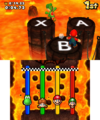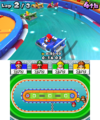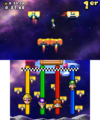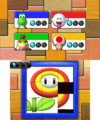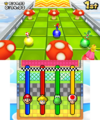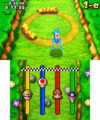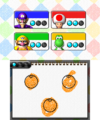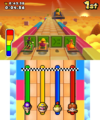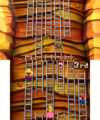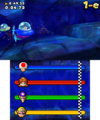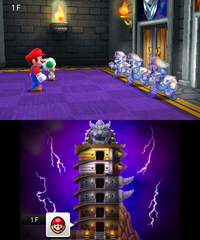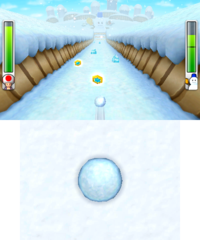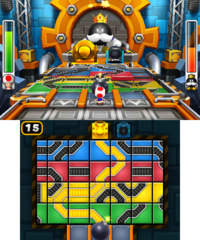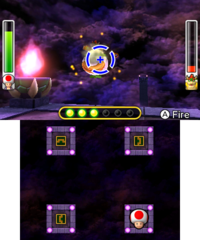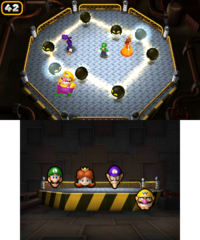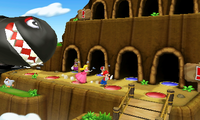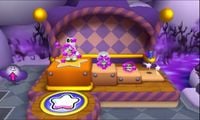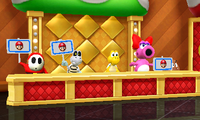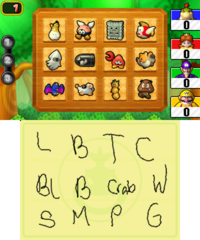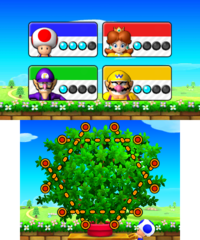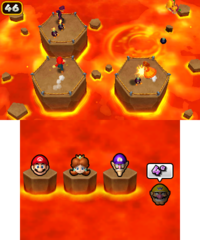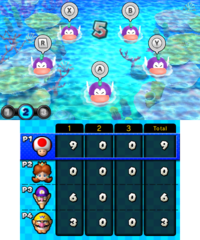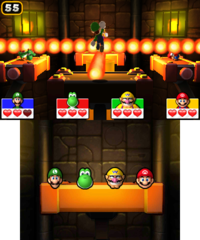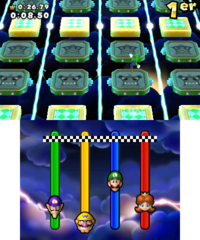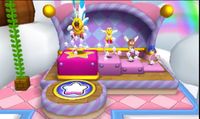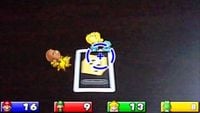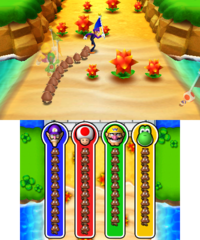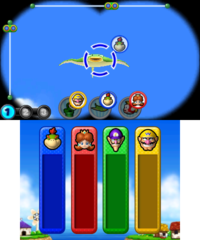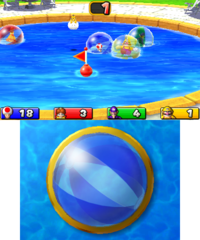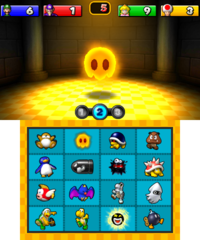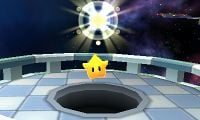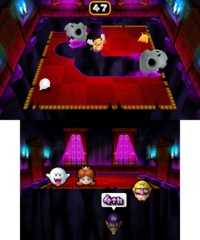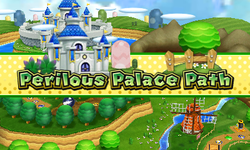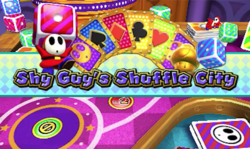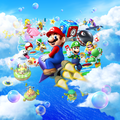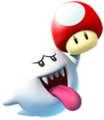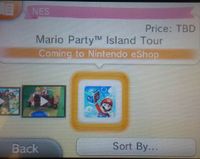Mario Party: Island Tour: Difference between revisions
7feetunder (talk | contribs) |
m (Correcting the fact that the top 100 is actually NOT in the main Mario Party series, it's just a spin-off like Star Rush and The Top 100) |
||
| Line 13: | Line 13: | ||
|input= {{input|3ds=1}} | |input= {{input|3ds=1}} | ||
}} | }} | ||
'''''Mario Party: Island Tour''''' is a party game for the [[Nintendo 3DS]], released first in North America in November 22, 2013 and the second [[Mario Party (series)|''Mario Party'']] game to be developed by [[Nd Cube]]. It is the twelfth installment (seventeenth in Japan) in the [[Mario Party (series)|''Mario Party'' series]], the third installment for a handheld console, and the first ''Mario Party'' to be developed for the Nintendo 3DS. ''Mario Party: Island Tour'' has gameplay objectives unique to it compared to other entries in the ''Mario Party'' series. Rather than traveling around a board to obtain the most quantity of a particular item, either separately or together on a vehicle, players need to race their opponents to the finish in a linear, one-way board, with certain objectives in the race differing depending on the board played on. The game additionally retains several key elements from other ''Mario Party'' titles, namely obtaining and using items to gain an advantage over opponents and playing a wide variety of [[minigames]]. | '''''Mario Party: Island Tour''''' is a party game for the [[Nintendo 3DS]], released first in North America in November 22, 2013 and the second [[Mario Party (series)|''Mario Party'']] game to be developed by [[Nd Cube]]. It is the twelfth installment (seventeenth in Japan) in the [[Mario Party (series)|''Mario Party'' series]], actually being a spin-off to them, the third installment for a handheld console, and the first ''Mario Party'' to be developed for the Nintendo 3DS. ''Mario Party: Island Tour'' has gameplay objectives unique to it compared to other entries in the ''Mario Party'' series. Rather than traveling around a board to obtain the most quantity of a particular item, either separately or together on a vehicle, players need to race their opponents to the finish in a linear, one-way board, with certain objectives in the race differing depending on the board played on. The game additionally retains several key elements from other ''Mario Party'' titles, namely obtaining and using items to gain an advantage over opponents and playing a wide variety of [[minigames]]. | ||
Due to the platform being the Nintendo 3DS, some of the minigames take advantage of the system's features, such as the stereoscopic 3D, gyroscope, mic, augmented reality (AR), and the touch screen. The game additionally uses StreetPass where players can play minigames if their system has picked up signals from other Nintendo 3DS systems that also have the game and unlock special items from it. Up to four people can play together either with local multiplayer or Download Play using only one game cartridge, similar to how ''[[Mario Party DS]]'' and later ''Mario Party'' installments for the Nintendo 3DS handle multiplayer. | Due to the platform being the Nintendo 3DS, some of the minigames take advantage of the system's features, such as the stereoscopic 3D, gyroscope, mic, augmented reality (AR), and the touch screen. The game additionally uses StreetPass where players can play minigames if their system has picked up signals from other Nintendo 3DS systems that also have the game and unlock special items from it. Up to four people can play together either with local multiplayer or Download Play using only one game cartridge, similar to how ''[[Mario Party DS]]'' and later ''Mario Party'' installments for the Nintendo 3DS handle multiplayer. | ||
Revision as of 10:16, June 30, 2018
This article is under construction. Therefore, please excuse its informal appearance while it is being worked on. We hope to have it completed as soon as possible. This article is currently under construction by Baby Luigi (talk).
Template:Infobox Mario Party: Island Tour is a party game for the Nintendo 3DS, released first in North America in November 22, 2013 and the second Mario Party game to be developed by Nd Cube. It is the twelfth installment (seventeenth in Japan) in the Mario Party series, actually being a spin-off to them, the third installment for a handheld console, and the first Mario Party to be developed for the Nintendo 3DS. Mario Party: Island Tour has gameplay objectives unique to it compared to other entries in the Mario Party series. Rather than traveling around a board to obtain the most quantity of a particular item, either separately or together on a vehicle, players need to race their opponents to the finish in a linear, one-way board, with certain objectives in the race differing depending on the board played on. The game additionally retains several key elements from other Mario Party titles, namely obtaining and using items to gain an advantage over opponents and playing a wide variety of minigames.
Due to the platform being the Nintendo 3DS, some of the minigames take advantage of the system's features, such as the stereoscopic 3D, gyroscope, mic, augmented reality (AR), and the touch screen. The game additionally uses StreetPass where players can play minigames if their system has picked up signals from other Nintendo 3DS systems that also have the game and unlock special items from it. Up to four people can play together either with local multiplayer or Download Play using only one game cartridge, similar to how Mario Party DS and later Mario Party installments for the Nintendo 3DS handle multiplayer.
The game was eventually released as a Nintendo Selects title in multiple regions including North America, Europe, and Oceania, being one of the best-selling titles for the Nintendo 3DS.
Story
After a relaxing day around Peach's Castle, Mario and the gang notice a strange letter in a bubble saying they are happily invited to the Party Islands. The gang then cheers about it but then the letter suddenly traps the gang in bubbles to carry them though the sky to the Party Islands.
While Mario and the gang are partying and playing games, Bowser shows up, feeling jealous about why Mario and his friends are invited, so he builds Bowser's Tower, saying that anyone can join him at his evil party. He begins locking all the fun from the Party Islands in bubbles. He also puts evil magic in the bubbles made by the bubble machine to make bubble clones of the gang to guard the tower.
Gameplay
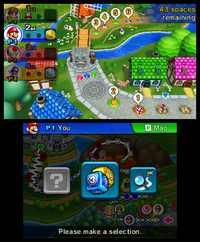
Unlike the direct preceding game, Mario Party 9, where all four players travel together through a vehicle and aim to obtain the most Mini Stars, Mario Party: Island Tour uses the traditional independent four player gameplay as seen in previous Mario Party entries. The ultimate goal of the game in most of the boards is to race opponents on a linear-designed board to the finish line, unlike other Mario Party games where players are required to amass the most amount of a certain item to win in all boards. In order to advance through the board, players roll a Dice Block numbered from 1 to 6 to dictate their movement. Each board has its own play style with different rules from another: one board, Star-Crossed Skyway requires players to amass the most Mini Stars while Kamek's Carpet Ride requires players to land exactly on a particular space, called a Just-Right Space, by using numbered cards. Another feature of these boards is to replace the "6" on the Dice Block with another feature, such as a Banzai Bill icon on Banzai Bill's Mad Mountain that causes players to fall back to the halfway point or the start of the board or a 0 in Rocket Road, meaning the player cannot move at all. Prior to starting out, Yellow Toad explains the board's play style and after players are done viewing the rules, they roll a Dice Block to determine their turn order: players who roll a higher number than others will move earlier. In this game, a Round, similar to turns from earlier Mario Party titles, is taken once every player has rolled a Dice Block and moved accordingly, and while in earlier Mario Party titles had a limited amount of turns to take until the game ends, Mario Party: Island Tour proceeds until all players have reached the end goal. When starting their own round, players can either opt to use an item if an item is available for use or look around the map to plan out movement. If players end the game in a tie, a Dice Block roll determines who wins the game.
When players land on a Space, an event occurs depending on the type of space landed. Their function and design appears to be based off Mario Party 9; for example, if players land on a Green Space, nothing occurs while if a player lands on an Item Space on a specific type of board, they receive an item from a pool of randomized items. These items can either benefit the player directly or obstruct opponents. Players can carry up to two items, and players can use only one item per round.
Some boards have players participating in minigames, either after every turn or if a Free-for-All Space is landed on. These minigames are small, short activities that have players competing against each other in defined, simple rules, most of them within a time limit. Some minigames involve players surviving a horde of enemies, some involve players racing against one another, some require the player to obtain the most points within a time limit, etc. If the player performs the best in the minigame, depending on the board played on, they receive priority when deciding which prize item to take or how much items are rewarded to them. The lower the rank players are, the lower the priority for selecting items and the less of a reward they receive, with last place players either receiving nothing or the worst rewards. If minigames end in a tie, a Dice Block is used to break the tie.
Mario Party: Island Tour supports local multiplayer if players have multiple cartridges or Download Play if there is only one cartridge. Up to four players can play the game, and they can participate with the player in Party Mode and Minigames Mode.
Modes
There are five different play modes in the game.
Party
Template:Quote2 Party Mode is the main mode of Mario Party: Island Tour that uses the default gameplay as described above. Up to four players can participate in this mode. Players first pick from a selection of available boards, all which play differently from each other in terms of mechanics and goals. After that players choose their character out of a cast of 10 playable characters, with 9 default characters and one unlockable. If there are not enough players, players can fill in empty slots with selected computer-controlled players from the remaining characters. Players can then select the difficulty of each individual CPU player as well as the type of minigames that will be played with. Character settings are then saved the next time players access the mode, including those of CPU opponents.
Minigames
Template:Quote2 Hosted by Blue Toad, players can play in one of the many minigames in Mario Party: Island Tour through this mode. Unlike most Mario Party installments, all minigames are available from the start. Minigames Mode has three ways to play: Free Play, Time Attack, and Hot-Air Hjinks. Free Play allows up to four players to participate, and like Free Play from previous installments, players have a free choice to decide which minigame to play in. Once a minigame is played on, players have the option to play the minigame again, go to a randomly selected different minigame, go back to the minigame menu, or go back to the main menu. Time Attack is a single player mode whose objective is to clear a set amount of ten minigames the quickest. Each minigame also contains optional objectives to meet if players want to further lessen the time it takes to complete them. Once all minigames are played on, the record time is saved. These are the minigames played in Time Attack:
The last mode is Hot-Air Hjinks, where up to four players can participate in. Players ride a hot air balloon, and in order to rise, they must clear minigames that are randomly selected through a roulette. For settings, players can use either All or Easy minigames and if their minigames require the Mic or not. Prior to starting out, players can set their objective to win 3, 5, or 7 minigames. If a player reaches past a certain level, the last place players get to stop the roulette wheel. Whichever player reaches the mark set first wins the mode.
StreetPass Minigames
Template:Quote2 StreetPass Minigames mode takes advantage of the Nintendo 3DS's StreetPass feature. Prior to setting up, players select their character to use in the mode and the choice to turn it on. If turned on, players who own Mario Party: Island Tour can pick up tags from other players who also own Mario Party: Island Tour and have it activated. When a tag is received, the Nintendo 3DS's LED light glows green, and a green dot notification is shown on the main menu on the StreetPass Minigames tab. When the mode is selected when a StreetPass tag is active, players see the other players' characters and their skill level, which dictates how difficult the CPU opponent controlling that character will be in the minigame. Players can participate against that character only once, unless the Nintendo 3DS is tagged with the same person the next day.
Bowser's Tower
- Main article: Bowser's Tower
Bowser's Tower is the sole single player-focused mode of Mario Party: Island Tour and where the main story takes place. Players need to progress up a tower, and to progress, they need to win a gauntlet of minigames. Bowser's Tower contains 30 floors, where the opponents get progressively harder the more players progress up the tower. At every fifth floor, a boss-type minigame is played. Green Toad tags along the player character on the way, and the player faces off against Bubble Clones, bubble copies of the playable characters that players face off against in this mode. Players beat the game when they clear Bowser's Sky Scuffle, and they unlock Bowser Jr. as a playable character.
Collectables
Template:Quote2 Much like Mario Party DS and Mario Party 9, players can earn Mario Party Points by playing boards, completing Bowser's Tower or playing Minigames. This points can be used to buy "Bubbles" and "Memories", voice recordings or music from the various characters, boards or minigames. These bubbles need to be bought from the gallery with various points, and not all bubbles are unlocked initially: the bubbles are unlocked when players first encounter them by simply playing the different modes and boards.
Characters
Playable
There are a total of 10 playable characters in Mario Party: Island Tour, consisting of 9 default characters and 1 unlockable character (Bowser Jr.).
| Template:Color-link | Template:Color-link | Template:Color-link-piped | Template:Color-link-piped | Template:Color-link |
|---|---|---|---|---|
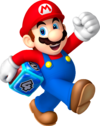
|
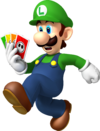
|
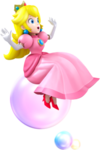
|
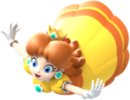
|
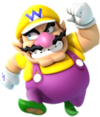
|
| The high-jumping hero wouldn't miss the party when his name is on the box. | Mario's lanky bro is always ready to roll. | She may be royalty, but this princess isn't above a minigame party. | Princess Peach's friend is no wallflower—she's in it to win it. | If you invite Wario to a party, you can be sure he’ll take things to extremes. |
| Template:Color-link | Template:Color-link | Template:Color-link | Template:Color-link | Template:Color-link* |
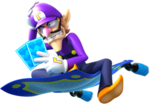
|
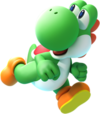
|
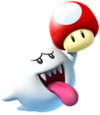
|

|
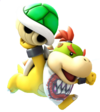 |
| He may not always be a people person, but Waluigi still loves a party. | Mario's green buddy is a good egg, so he's always invited to the party. | Add this gregarious ghost to the party to scare up some fun. | Loyal to a fault, Toad is ready to put friendship aside in the minigames. | He doesn't have his own tower, but you can't keep him from playing. |
*Bowser Jr. can be unlocked by completing Bowser's Tower.
Bosses
Other
- Moo Moos
- Para-Biddybuds
- Paragoombas
- Peepas
- Penguins
- Piranha Plants
- Pokeys
- Rabbits
- Rosalina
- Scaredy Rats
- Shy Guys
- Skewers
Boards
As the title suggests, the boards are split between various themed islands. Seven gameboards are included in the game. Of these boards, one is unlocked by playing through every other board except for Shy Guy's Shuffle City due to the necessity for three or more players (Bowser's Peculiar Peak), and the other six are available from the start of the game.
Spaces
| Item | Effect |
|---|---|
Dash Space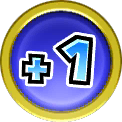
|
A space which will let you advance (2, 3, 4, or 5) spaces. |
Back Space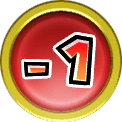
|
When the player lands here, they go back the number of spaces on it. |
Item Space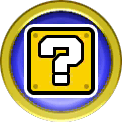
|
A space which will give you an item. |
Green Space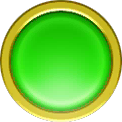
|
Nothing happens when you land here. |
Piranha Plant Space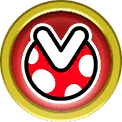
|
The Piranha Plant will throw you back a number of spaces. |
| Lucky Space (Event Space (blue) in PAL versions) 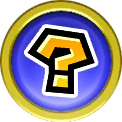
|
Land here and something good will happen. |
| Unlucky Space (Event Space (red) in PAL versions) 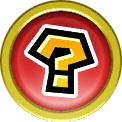
|
If you land here, something bad will happen. |
Free-for-All Space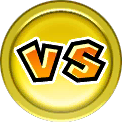
|
A space where you play a minigame to win an item. |
Bowser Space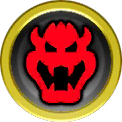
|
A space where something bad will happen! |
Dead End Space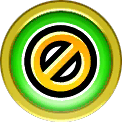
|
You must stop on this space, where an event will happen. |
Challenge Area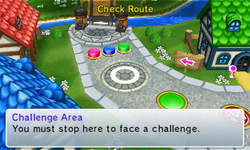
|
You must stop here to face a challenge. |
Goal Space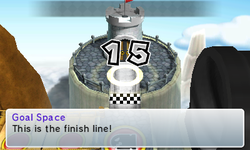
|
The final space on the board. |
Safe Space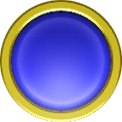
|
(only on Banzai Bill's Mad Mountain) - A space where the player cannot get hit by a Banzai Bill. |
Danger Space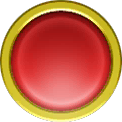
|
(only on Banzai Bill's Mad Mountain) - A space where the player might get hit by a Banzai Bill. |
| Switch Space File:MPIT SpaceSwitch.png |
(only on Banzai Bill's Mad Mountain) - If the player lands here, Banzai Bill will launch from a new location. |
Banzai Bill Space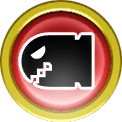
|
(only on Banzai Bill's Mad Mountain) - This space launches Banzai Bill. |
| Switch Space File:MPIT SpaceSwitch.png |
(only on Banzai Bill's Mad Mountain) - If the player lands here, Banzai Bill will launch from a new location. |
Booster Space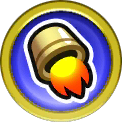
|
(only on Rocket Road) - This space gives players a Booster. |
Warp Space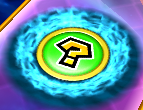
|
|
Kamek Space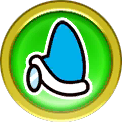
|
(only on Kamek's Carpet Ride) |
| Just-Right Space File:MPIT SpaceJust-Right.png |
(only on Kamek's Carpet Ride) |
Items
Dice Blocks
Dice Blocks can be won from minigames in Perilous Palace Path and Bowser's Peculiar Peak.
| Item | Effect |
|---|---|
Gold Dice Block
|
Adds one to six spaces to the player's roll. Awarded to first place after a minigame. |
Silver Dice Block
|
Adds one to three spaces to the player's roll. Awarded to second place after a minigame. This is not given out if only two players are participating. |
Bronze Dice Block
|
Adds one or two spaces to the player's roll. Awarded to third place after a minigame (or second place, if only two players are participating). |
Custom Dice Block
|
Allows the player to roll any number. |
Bowser Dice Block
|
Same effects as a normal Dice Block. The players can remain where they are if they get the roll doubled with another Bowser Dice Block. |
1-6 Bowser Dice Block
|
Adds one to six spaces to the player's roll. The players can remain where they are if they get the roll doubled with another Bowser Dice Block. Awarded to fourth place after a minigame (third place if there are only three players, or second place if there are only two players). |
1-3 Bowser Dice Block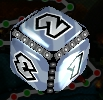
|
Adds one to three spaces to the player's roll. The players can remain where they are if they get the roll doubled with another Bowser Dice Block. Awarded to third place after a minigame. This is not given out if there are only two players. |
1-2 Bowser Dice Block
|
Adds one or two spaces to the player's roll. The players can remain where they are if they get the roll doubled with another Bowser Dice Block. Awarded to second place after a minigame, or first place if there are two or three players. |
Cards
In Kamek's Carpet Ride and Shy Guy's Shuffle City, cards are used to make the player move and have different effects on the character.
| Item | Effect |
|---|---|
Random Card  
|
Randomly decides how many spaces the player will move. |
Precision Card
|
Moves the player the number of spaces shown on the card. |
Power Precision Card 
|
Moves the user forwards by the number shown, while the others move backwards by the same amount. |
Bowser Card
|
The player who holds this card after three turns will receive a Bowser Penalty. |
Board-specific items
Perilous Palace Path
| Item | Description |
|---|---|
| Setback Shell |
Sends an opponent back two spaces. |
| Backwards Bill |
Sends an opponent back five spaces. |
| Blooper Chopper |
Halve the number your opponent rolls. |
| Lightning Score Striker |
Subtract 3 from your opponent's roll. |
Lakitu Leech
|
Take one random item from an opponent. |
| Dash Mushroom |
Add 3 to your dice roll. |
| Golden Dash Mushroom |
Add 5 to your dice roll. |
Super Star
|
Multiply your dice roll by 2. |
Crazy Kamek
|
Switch places with an opponent. |
Chaos Kamek
|
Switch everyone's places. |
Star-Crossed Skyway
| Item | Description |
|---|---|
Mini Star
|
Collect as many of these little twinkling stars as you can! |
Mini Ztar
|
These dangerous purple stars will lower your Mini Star total! |
Rocket Road
| Item | Description |
|---|---|
| Booster |
Use boosters to multiply the number you roll on the dice block. Each step will become a giant leap! |
Minigames
- Main article: List of Mario Party: Island Tour minigames
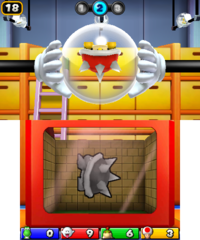
Mario Party: Island Tour contains 81 minigames, the most minigames for a handheld installment barring the remastered minigames in Mario Party: The Top 100. Minigames are split into four categories: General minigames, Boss minigames, Puzzle minigames, and Extra minigames. General minigames play similarily to 4-player or Free-for-All minigames from previous installments: up to 4 players compete against one another to best the minigame, though players can compete against less players if they choose so. Boss minigames, first introduced in Mario Party 9, return in Mario Party: Island Tour. These involve players facing up against a particular boss enemy, and the objective is to take out the boss's HP first before they deplete the players' HP. Unlike their appearance in Mario Party 9, Boss minigames involve only one player. Puzzle minigames are self-explanatory: players solve minigames in a traditional puzzle game format either against themselves to set a new record or competitive against opponents. Finally, Extra minigames take advantage of the Nintendo 3DS hardware to play minigames, with The Choicest Voice using the mic and Ka-Goomba! and Sinking Feeling requiring AR Cards to play.
Minigames are sorted into two types of categories: minigames can be classified as "Easy", which are usually simpler minigames than the others. Players can toggle to play only "Easy" type minigames in Party Mode or Hot-Air Hjinks. Another type is whether the minigame uses a mic or not, and players can exclude minigames that use the mic from the set of minigames in the aforementioned modes.
Mario Party: Island Tour does not feature 2-vs-2, 1-vs-3, or 1-vs-Rivals minigames, making it one of the few Mario Party installments not to feature these categories of minigames. Additionally, this game is the only Mario Party game that has a minigame that cannot be accessed by a single player. In this case, the minigame Utter Nonsense requires 2 or more human players to play.
Regional differences
- The game's descriptions for minigames, boards, and features and the naming scheme for minigames is different in European English than it is in North American English. For example, Perilous Palace Path's description in North American versions of the game reads as "Power yourself up and knock opponents out of the way with special items as you race to the finish!" while European versions of the game reads as "Race to the castle and use items to help you along the way!". Minigames can have drastically different titles; for example a minigame named Garden of Eatin' is called Blooming Nuisance in European versions of the game. In one case, a minigame's European title coincidentally shares its title with another unrelated, North American minigame: Cheepers Keepers in North American versions refers to a button masher minigame, called Hook, Line and Cheep Cheep in European versions of the game, while Cheepers Keepers in European versions refers to a minigame counting diamonds in a Cheep Chomp's mouth, called Cheep Diamonds in North American versions of the game.
- The European Spanish announcer has a different voice actor than the North American Spanish announcer.
Staff
- Main article: List of Mario Party: Island Tour staff
Mario Party: Island Tour is developed by Nd Cube and published by Nintendo. This is the second Mario Party game Nd Cube has worked on after Mario Party 9 and the first handheld installment that they developed for. The game was directed by Yukio Umematsu, who would later work under planning for the next Mario Party installment, Mario Party 10. The game's sound was directed by Ichiro Shimakura, known for directing the sound in other Mario Party installments while the soundtrack was directed by Rei Kondoh, who would later compose music for Mario Party 10.
Reception
Critical reception
Mario Party: Island Tour has received generally mixed reviews. The game currently averages a 59% based on 28 reviews on GameRankings[1] and a 57 based on 47 reviews on Metacritic[2]. As with most Mario Party games, Mario Party: Island Tour was praised for being fun to play with other people rather than playing alone and some of its mechanics were praised for being innovative, though general criticisms of the game include its short length, poorly implemented gimmicks, as well as the lack of online play.
Scott Thompson of IGN gave Mario Party: Island Tour a 5.5 out of 10, criticizing its motion control, "uninventive" minigames, and its "poor" single-player campaign unlike Mario Party 9, but praising its unique board rules and use of Download Play.[3] While expecting this game to perform around the same level as the console Mario Party games due to the inventive touchscreen implementation and unique, new rules for the seven game boards compared to previous Mario Party games, Thompson felt that the "lackluster single player experience", Bowser's Tower, was a slow-paced repetitive grind, and the "bland minigame design" was a step back, due to the similarity of the minigames from the past entries in the Mario Party series and the only category of minigames being Free-for-All type minigames. Caitlin Cooke of Destructoid gave the game a 4 out of 10,[4] disappointed that the game's board gameplay did not play as the original titles did and that the boards felt like chopped up variations of a single mode from previous Mario Party games. She additionally pointed out that the game has a too heavy hand with hand-holding players. She, however, enjoyed the single player mode of Bowser's Tower, the minigames, and the single-cartridge local mulitplayer, though criticized the lack of online play.
On the other hand, Kimberly Keller of Nintendo World Report gave the game the highest critic review, an 8.5 out of 10.[5] She has praised the innovation of the boards, which has each their unique play styles, the usage of the Nintendo 3DS capabilities in minigames, as well as noting that the single player modes Bowser's Tower, StreetPass Minigames, and Collectables being engaging, with Bowser's Tower being the best of the single player modes, though she had criticized the lack of setting a difficulty setting for Bowser's Tower. She also praised the Download Play multiplayer, though criticized the lack of online multiplayer.
| Reviews | |||
|---|---|---|---|
| Release | Reviewer, Publication | Score | Comment |
| Nintendo 3DS | Kimberly Keller, Nintendo World Report |
8.5/10 | "A fantastic addition for the 3DS. The graphics are crisp and utilize 3D well, while the music fits each game and board without becoming monotonous. Every mode and board is easy to pick up and play with anyone, anytime.. Island Tour is a perfect balance of old and new that keeps the game fresh with playing styles to meet every need." |
| Nintendo 3DS | Heidi Kemps, GameSpot | 7/10 | "It's not a perfect party by any means, but some good design considerations, better-than-average variety, and always-enjoyable Mario thematics put Mario Party: Island Tour a few notches above your average video game bash-in-a-box." |
| Nintendo 3DS | Dave Letcavage, Nintendo Life | 6/10 | "Those seeking a long-lasting single-player experience may want to steer clear though, as there isn't enough depth to the solo-focused modes to keep you engaged for very long." |
| Nintendo 3DS | Scott Thompson, IGN | 5.5/10 | "Island Tour’s single-player campaign is laughably bad, and the ambitious, content-rich multiplayer options and unique game boards are ultimately dragged down by mostly boring minigames and unfortunate system-jerking motion control." |
| Nintendo 3DS | Caitlin Cooke, Destructoid | 4/10 | "The lack of online play and the overall single-player experience is a pretty big bummer. Unless you’re desperate and need a quick Mario Party fix on the go, stick with a console version if you can." |
| Aggregators | |||
| Compiler | Platform / Score | ||
| Metacritic | 57 | ||
| GameRankings | 59% | ||
Sales
Mario Party: Island Tour is the 20th best selling game for the Nintendo 3DS, selling 1.14 million copies worldwide, as of March 31, 2014.[6] It has become a Nintendo Selects title in various regions, including North America, Europe, and Oceania.
Pre-release and unused content
Mario Party: Island Tour's changes from the pre-release version to the final version ranges from minor aesthetic details to gameplay tweaks. Perilous Palace Path originally did not contain Moo Moos as ambient characters and a Whomp blocking the path. Originally, characters also used cards rather than regular items in Perilous Palace Path. In Banzai Bill's Mad Mountain, multiple Banzai Bills could get launched at once as opposed to only one in the final version of the game. In Rocket Road, more varieties of Lumas were added rather than just one type of Luma, the Yellow Luma. Mario Party: Island Tour originally had a working title as simply Mario Party before the final name, Mario Party: Island Tour, was chosen.
Glitches
Invisible Player Lucky Space Glitch
In order to perform this glitch, the player must land on a Lucky Space in the board Bowser's Peculiar Peak. If they happen to be blasted to a space that another player is currently on, then the two players clip through each other.
Gallery
- For this subject's image gallery, see Gallery:Mario Party: Island Tour.
Mario with a Dice Block.
Boo with a Dash Mushroom
Media
References to other games
- Super Mario Bros.: The main theme is rearranged in the minigames Xylophone Home and Goomba Tower Takedown. In Amp My Style, a rearrangement of the underground theme appears. In Perilous Palace Path, while in the Bowser Zone, a rearrangement of the castle theme appears. Also, the Starman theme is used for the Perilous Palace Path board whenever a player uses a Super Star.
- Super Mario 64 and Super Mario 64 DS: The "Koopa's Road" theme is rearranged for Bowser's Peculiar Peak. King Bob-omb appears as a boss in this game as he did here, and Bowser makes a reference to his interest with his moustache from the remake saying, "My next guard has an even more formidable moustache than Mario!" Also, the song "Slowly Bubble Up" sounds similar to the song used for the minigame Wanted.
- New Super Mario Bros.: Dry Bowser returns with his ability to throw bones.
- Super Mario Galaxy: Rocket Road is based on this game, and Rosalina appears as a cameo along with the Lumas and the Comet Observatory. Additionally, the theme of Good Egg Galaxy is rearranged in a part of Rocket Road's music.
- New Super Mario Bros. Wii: Banzai Bill's Mad Mountain is based on World 6 from this game.
- Super Mario 3D Land: The minigame Blown Hover features Flip Panels and the square mountains from World 4-5 from this game. Also, Dry Bowser's voice clips are borrowed from this game. Para-Biddybuds also make some cameos. The background of Fuel Me Once is very similar to World 1-1.
- Mario Party 9: The voices of the characters and minigame announcer are borrowed from this game. Music such as the minigame intro and results screen are rearranged from this game. Mini Stars and Mini Ztars return in Star-Crossed Skyway.
- New Super Mario Bros. 2: Bone Goombas and Bone Piranha Plants return.
- New Super Mario Bros. U: Waddlewings make some cameos.
Names in other languages
| Language | Name | Meaning | Notes |
|---|
Trivia
- For a time, the Nintendo 3DS eShop mistakenly stated Mario Party: Island Tour to be a title on the Nintendo Entertainment System.
References
- ^ GameRankings score for Mario Party: Island Tour. GameRankings. Retrieved December 5, 2017.
- ^ Metacritic score for Mario Party: Island Tour. Metacritic. Retrieved December 5, 2017.
- ^ Thompson, Scott. (November 22, 2013) Mario Party: Island Tour Review. IGN. Retrieved December 5, 2017.
- ^ Cooke, Caitlin. (November 27, 2013). Review: Mario Party: Island Tour. Destructoid. Retrieved December 5, 2017.
- ^ Keller, Kimberly. (November 22, 2013). Mario Party: Island Tour Review Nintendo World Report. Retrieved December 5, 2017.
- ^ "Financial Results Briefing for Fiscal Year Ended March 2014 (Briefing Date: 5/8/2014) Supplementary Information". (May 8, 2014). Nintendo. Retrieved December 5, 2017.
External links
- Official North American website (site currently redirects to information for Mario Party: The Top 100)
- Official Japanese website
- Launch Trailer
